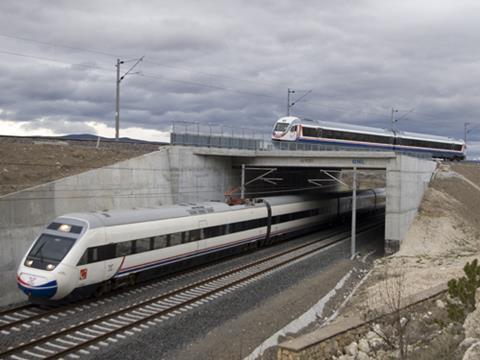
The decision to reform the governance and structure of Turkey’s railways has been heavily influenced by a desire to keep the country in step with EU rail policy. Indeed, proposals to unbundle state railway TCDD have been on the government’s agenda for more than a decade, since legislative proposals on the Organisation of the Railway Sector were issued back in February 2005.
After eight years of work, a formal decree to liberalise the rail sector was issued in May 2013, with the aim of ending the monopoly of incumbent TCDD and introducing a ‘competitive and transparent market environment’. This in turn was intended to stimulate uptake of rail transport by passengers and freight shippers by optimising fares and tariffs and improving service quality. At the same time, the government has committed to a major programme of infrastructure construction and railway renewal, under a Master Plan adopted in 2010 that would see more than 4 000 km of new line built by 2023, the centenary of the Turkish republic, alongside a major programme of double-tracking, electrification and resignalling of existing lines.
Significant progress has unquestionably been made in the liberalisation process. The first law dealing explicitly with unbundling of the railway came in 2011 through a Decree on the Administrative Structure and Duties of the Ministry of Transport, Maritime Affairs & Communication. This established a Directorate-General of Railways, which is tasked with delivering fair, non-discriminatory and sustainable competition. Several further regulations have since been passed to support the realisation of these objectives. The regulations now in force cover:
- Railway Infrastructure Access, including the determination of access charges, path allocation and capacity management.
- The registration of rail vehicles.
- Type approval of vehicles and major components.
- Safety, covering the responsibilities of train operators and ensuring the development, enhancement, monitoring and auditing of safety procedures across the industry.
- Transportation of hazardous materials.
In addition, the legislation issued to date envisages the creation of an entity known as TCDD Tasimacilik, which, after a one-year mobilisation period, would take on the rolling stock, staff and other assets of the existing state railway. However, TCDD Tasimacilik has still to come into being, although government sources suggest this is expected to happen as soon as next month. Financing of investment and debt for the new entity would be undertaken by the government for an initial five-year period.
Steps still to come
While the measures introduced to date have undoubtedly brought the liberalisation of the Turkish railway market several steps closer, the government is still working on several subsequent pieces of legislation. These include regulations in the following policy areas:
- The operation of socially-desirable passenger services where costs cannot be covered by the operator due to the prevailing commercial conditions.
- The conditions for market entry, aligning with principles of financial status, occupational qualifications and railway expertise. These regulations would apply to infrastructure managers, train operators, terminal and station managers, logistics companies and other parties interacting with the national network.
- Train crews and drivers, outlining the qualifications, health requirements and other competences and licences that crew must hold.
- Railway education, covering the regulation and licensing of training and examination centres.
- ‘Safety-critical missions’, outlining the documentation and licensing terms applying to operational and traffic management staff, including control centre teams and dispatchers.
- Verification and compliance of railway infrastructure and vehicles with relevant standards.
- The management, operation and monitoring of railway infrastructure assets.
- Passenger rights and the liabilities applying to train operators.
There is little doubt that the opening up of the market has been a complex and long-running process, but there is renewed optimism among the various players in the rail sector that it can be accomplished. While exact timescales remain difficult to predict, it seems likely that the first new entrants will take to the tracks in Turkey before the end of the decade at the very latest.
- Serap Zuvin and Nurgul Cakir are Attorneys at Law at international legal practice Serap Zuvin Law Offices. Based in Istanbul, the practice specialises in rail policy as well as aviation, healthcare and mergers and acquisitions issues.














